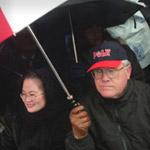On 6 January 2005, a federal judge dismissed all charges against Katrina Leung, the FBI informant who had been accused of being a double agent for China.
http://www.cnn.com/2005/LAW/01/06/fbi.spycase.ap/index.html Quote:Charges dropped in FBI 'spy case'
Judge throws out case against Chinese-American woman
LOS ANGELES, California (AP) -- A federal judge Thursday dismissed all charges against a Chinese-American woman accused of using a sexual affair with an FBI agent to gain unauthorized access to classified documents.
U.S. District Judge Florence Marie Cooper dismissed the case for prosecutorial misconduct, finding that the government had purposely made sure that Katrina Leung, a socialite with extensive China contacts, would not have access to her former lover, James J. Smith, for information regarding her case.
Smith, a former FBI agent, has pleaded guilty to a single count of making a false statement about the affair and agreed to cooperate with the government. He had been accused of mishandling classified material and allowing it to fall into Leung's hands.
Leung, of the Los Angeles suburb of San Marino, allegedly took the documents from his briefcase. She was not accused of transmitting them to China.
Thom Mrozek, spokesman for the U.S. attorney's office in Los Angeles, had no immediate comment on the court's decision, which the government can appeal.
Leung would have faced up to 14 years in prison had she been convicted of illegally copying and possessing national security papers that she intended to use, or could have used, to harm the interests of the United States.
"The government decided to make sure that Leung and her lawyers would not have access to Smith," the judge said in her decision. "When confronted with what they had done, they engaged in a pattern of stonewalling entirely unbecoming to a prosecuting agency."
"The courts have again made sure that truth and justice are not mere platitudes," Leung's lawyers, Janet Levine and John Vandevelde, said in a statement.
"She's gratified and excited about moving on with her life," Levine said of Leung. "She's reminded again about why this is such a great country."
A Reuters article published by Wired News provides additional detail:
http://wireservice.wired.com/wired/story.asp?section=Breaking&storyId=971745&tw=... Quote:
U.S. Judge Dismisses Case Against Accused China Spy
By Dan Whitcomb
LOS ANGELES (Reuters) - Citing "willful and deliberate misconduct" by prosecutors, a federal judge on Thursday dismissed the charges against a Chinese-American informant accused of taking classified papers from her FBI agent lover.
U.S. District Judge Florence-Marie Cooper threw out the case against Katrina Leung, saying that prosecutors had barred Leung's onetime lover and co-defendant, FBI agent James J. Smith, from speaking to the defense, then "misrepresented" their actions in court.
The decision apparently brings an abrupt and embarrassing end to the case against Leung, a former FBI informant known as "Parlor Maid" who was portrayed at the time of her 2003 arrest as a double agent for China but ultimately charged only with taking classified documents from Smith.
Smith, a former FBI counterintelligence agent and for nearly two decades Leung's handler, pleaded guilty last May to lying to the FBI about the adulterous sexual relationship and was cooperating with prosecutors in their case against her.
"The evidence makes it abundantly clear to the court that the government, in negotiating and drafting a plea agreement for Smith, wanted to secure his promise that he would not talk to Leung or her lawyers," Cooper wrote in a 10-page ruling.
"When confronted with Ms. Leung's motion to dismiss, the government proffered an assortment of explanations and denials," she wrote, adding later: "The government has engaged in willful and deliberate misconduct, depriving the defendant of her right of access to a critical witness in her defense."
Cooper said an email sent to prosecutors from a Department of Justice lawyer proved that they had ordered Smith not to speak to Leung or her defense attorneys. She said that when confronted with the email, prosecutors "engaged in a pattern of stone-walling entirely unbecoming to a prosecuting agency."
The case, which spawned sensational press coverage when Smith and Leung were arrested and details of their 18-year affair disclosed, may deliver a black eye for prosecutors if it ends with Cooper's ruling.
U.S. Attorney Debra Yang said she would consider an appeal.
"We strongly disagree with today's ruling," Yang said in a statement. "Since the defense made its motion we maintained, and continue to maintain, that there has been no misconduct by any prosecutor related to this case."
Defense attorneys, who have accused prosecutors of shifting blame to Leung to cover up an embarrassing episode for the FBI, hailed Cooper's decision and said their client looked forward to moving on with her life.
"Katrina Leung's nightmare is over," her lawyers, Janet Levine and John Vandevelde, said in a statement. "The courts have again made sure that truth and justice are not mere platitudes."
The news of Leung's arrest left many agog in Los Angeles, where she was known as a prominent businesswoman, society hostess and political activist who rubbed shoulders with the city's movers and shakers.















